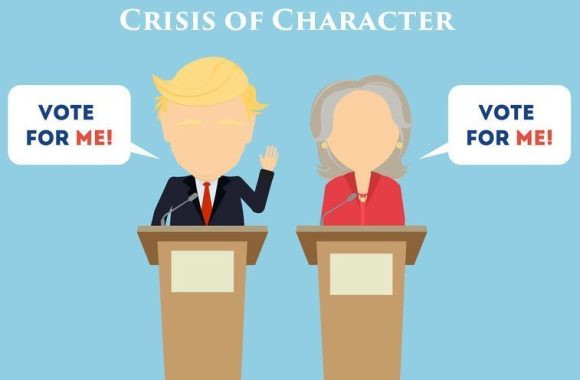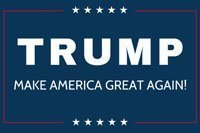The U.S. Presidential election season is notoriously long.
There are endless rounds of stump speeches from townhalls to factory floors, primary elections in fifty states, debates across major media channels, and fundraising events targeting big donors and modest checkbooks alike.
This painstakingly laborious electioneering grates on voters, commentators, and even the candidates. Yet one redeeming feature of a long campaign season in America is that it presents a particularly robust opportunity for themes to emerge – more so than in most countries.
Often these themes stem from the communications-driven messages that resonate to the core of the American zeitgeist of the time.
Whether Reagan’s “Morning in America” or Obama’s “Hope and Change” campaigns, it’s the communicators who win the headlines, using to their full extent the media platforms available at the time.
And then there is 2016. This year, it’s different. This election will not be defined by the strength of the communications narrative to drive the winning candidate home. It will be defined by a human virtue: character.
Regrettably, character is not playing a role, because people believe they have the great and the good of America in the race that we have come to admire in our Hollywood films – Josiah Bartlett of “West Wing” fame or Harrison Ford, whose president in “Air Force One” delivered one of the most decisively heroic American lines of all time: “Get off my plane.” Rather, Decision 2016 reflects a crisis of character which has forced mainstream America to ask ourselves the role that character plays in our society.
Indeed, most Americans will make their decision in this election based on which character flaw they believe is most serious, morally corrupt, and dangerous for the occupier of the nation’s highest political office.
For Trump supporters, it is impossible to overlook the Clinton political machine as a finely-tuned yet deeply sinister network of cover-ups and paper trails leading to an unethical political career.
For Clinton supporters, it is impossible to overlook Trump’s brand of morality, whereby his own ego and dismissal – even degradation – of others presides over his entire world view.
Many undecided voters, however, are caught in the middle. Casting their gaze in one direction, they see uncomfortable truths yet immense experience. Casting their gaze in the opposite direction, they see a bully, but one who will shake up the political establishment.
So in drawing the conclusion that the character crisis surpasses any number of communications narratives in this year’s election campaign, we naturally turn online, where scores of Americans are discussing the election each and every day.
In tech circles, this is known as the “second screen” phenomenon – that is to say, the concept of watching a major televised event on one screen while reacting, responding, and commentating on social media in real time.
Indeed, the intensity of this real-time interaction has pulled many of us away from watching the recorded debate at a later, more convenient date and time: American expatriates in today’s social media-driven political climate prefer to watch in real time at odd hours of the evening, thus joining the global conversation as it unfolds.
Clues to the wide-sweeping character crisis can be found in the political memes that have taken off in this election. There was the second-debate obsession with Ken Bone: a sincere, huggable, red-sweater-and-glasses-wearing Midwesterner who represented everything Trump and Clinton seem to lack: good old fashioned American values. Earnest demeanor. Humble curiosity. Character.
And then there are the nostalgic throw-back memes to a more innocent era: photos posted by Democrats and Republicans alike featuring images of past political candidates, asking if we can just go back to the good old days.
Michelle Obama hugging President George W. Bush spread round the Internet like wildfire. It now seems nostalgic, almost quaint, to have ever criticized Michelle or Bush because we disagreed with them politically. The hug photo hit a chord with the connected citizenry. The humanity of a shared experience in the Oval Office. A First Lady who delivered one of the greatest speeches attacking Donald Trump’s terrifying view of women. A President who responded to September 11 by insisting he fly back to the nation’s capital, against the advice of his security team to board a plane amidst the uncertainty. Character.
In fact, very few Internet memes have centered around the communications narrative of either candidate.
“Make America Great Again” is present yet unfocused for Trump supporters, overshadowed by ‘Trumpsters’ believing that his character flaws are more benign than Hillary’s.
“I’m with Her” is compelling but not as convincing as reminding undecided voters that Clinton Foundation funding decisions and email servers matter less than sexual assault and accusations of rigged elections.
The character crises as front and center of this election campaign was never more on display than during the third and final debate. It was the moment when moderator Chris Wallace asked Trump whether he would refuse to accept the election result. “I will keep you in suspense, OK?” Trump responded.
While Trump’s own words from the now-famous Billy Bush video lit the flame that launched the early stages of a Trump combustion, this statement in the FOX News Debate is quite possibly the fuel in the Trump fire which will be impossible to put out. In Trump’s ill-articulated sentence – a sentence which would never be a campaign catch-phrase, rallying-cry, or clever soundbite – he challenged the very foundation of a democratic nation: democracy itself.
Although democratic ideals stem originally from the far corners of the globe, Americans handily tend to claim more than their fair share of “owning” democracy. It’s their thing. It’s what their men in uniform give their lives to protect. Democracy means freedom. It means security of personal opinion. It is sacred to the American state of mind. It is the Alexis de Tocqueville key to American prosperity and ingenuity.
They are gradually learning to “export” democracy a little less – or at least more subtly – than they did during the Cold War or Iraq War years, but deep down, Americans still stand by the idea that if only they could bring democratic principles to the rest of the world, they would usher in a more stable and more just global experience. Underpinning Facebook takedown policies, U.S. State Department civil society initiatives, and grade school mock elections, is democracy.
So when Donald Trump decided to go beyond the realm of his own past, his own decisions, his own company, and his own so-called “smarts” to take on the democratic model of free and fair elections, he struck at the core of the American heart. His words surprised some, flabbergasted many, and disappointed every voter who casts his or her vote because democracy matters in America.
A chill went down mainstream America’s spines after the final debate. Americans have realized the vote on November 8th may not begin a well-known process of healing, and then gearing up for the next round of creative agencies to come up with new campaign slogans and fresh communications narratives painted in red and blue.
A crisis of character is not so easily overcome. After all, it’s thanks to the presumed character flaws of the British elite in the eighteenth century that America fought its War of Independence. Chilling.
About the author: Elizabeth Linder

A key member on the Google/YouTube politics team during the 2007/08 election cycle, when social media first splashed on the screen as a powerful political tool, Linder has trained hundreds of heads of state, politicians, and diplomats on the places where the connected public and political leadership intersect.
Elizabeth has written and spoken extensively about the intersection of politics and society in a digitally-connected era.
Read more about Elizabeth Linder




